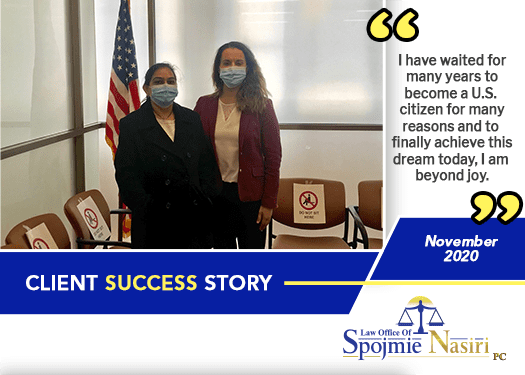Citizenship is the final step for a U.S. immigrant to integrate into American life. Becoming a U.S. citizen is a great honor, but the process of obtaining citizenship can be a time consuming and complicated.
At the Law Office of Spojmie Nasiri PC, we are here to assist you with your citizenship application process. Our office has years of experience with citizenship related cases and are here to help you through every step of citizenship process from receiving a consultation, to preparing the case and the application and appearing with you at the interview and examination. Contact the Law Office of Spojmie Nasiri PC to get valuable legal advice throughout your U.S. citizenship application process.
To find out the 10 Steps to Naturalization and understanding the Process of Becoming a U.S. Citizen, please visit this USCIS Website.
The United States has a rich history of welcoming immigrants from all over the world. Many of these immigrants have chosen to become United States citizen for different reasons. Some have chosen to become a United States citizen out of a sense of pride or to guarantee that they will never be deported or to apply for certain jobs requiring citizenship. Others have chosen to become United States citizens for political reasons and to participate in U.S. politics in order to ensure they have a voice in State and Federal elections.
Some may wonder why it is important to acquire United States citizenship after obtaining their green card, especially when considering the difficulties involved with procuring United States citizenship. I can’t stress the importance of continuing the process of ultimately acquiring United States citizenship, as the rights of a United States citizen are far greater than that of a lawful permanent resident. As a lawful permanent resident, one has a right to remain in the United States so long as the individual maintains a criminal record that does not make them deportable for the criminal offense. This is where getting a Pleasanton immigration lawyer can come in handy. Having a great attorney is key.
Whether you have recently become a lawful permanent resident or have been a lawful permanent resident for five years or more, the importance of becoming a US citizen cannot be overstated if you have long term plans to remain in the United States. In fact, the decision to become a United States is one of the most important decisions in an immigrant’s life. When you decide to apply to become a U.S. citizen, you will not only be showing your commitment to the United States and loyalty to its Constitution, but you are also rewarded with all the rights and privileges that are part of U.S. citizenship. U.S. citizens, both born and naturalized, are eligible for many rights additional benefits based on their status as U.S. citizens. These benefits include, the right to hold elected office, right to obtain certain government jobs. The right to vote allows an individual to voice their opinions and to allow for their voice heard on important social, political and economic issues at local, state and national levels including presidential elections. As a United States citizen, one also has the right to legally petition to bring for family members to the United States without long wait periods. More importantly, as a U.S. citizen, you cannot be deported back to your home country, so this adds another reason why it is important to pursue naturalization if you are eligible and if you intend to remain in the United States permanently. Today, millions of lawful permanent residents reside in the United States, with some 7.9 million that are qualified for U.S. naturalization.
For information on the process of applying for U.S. citizenship, please visit the following website pages at USCIS.gov:
• A Guide to Naturalization (USCIS) A Guide to Naturalization: Provides information on the benefits citizenship, and an overview of the naturalization process, and eligibility requirements.
• Citizenship Resource Center (USCIS) Provides information for lawful permanent residents to better understand the citizenship process and information on the naturalization interview and test. The website also provides teachers, volunteers, and immigrant-serving organizations with a one-stop portal for citizenship information and resources.
• Citizenship Through Naturalization (USCIS) Naturalization is the process by which U.S. citizenship is granted to a foreign citizen or national after he or she fulfills the requirements established by Congress in the Immigration and Nationality Act (INA).
• Citizenship Through Parents (USCIS) Provides information on how an individual can derive citizenship through their parents. Whether someone born outside the United States to a U.S. citizen parent or parents is a U.S. citizen depends on the law in effect when the person was born.
• Citizenship for Military Personnel & Family Members (USCIS) Provides information on military personnel and eligibility for U.S. citizenship. USCIS recognizes the important sacrifices made by non-U.S. citizen members of the U.S. armed forces and their families. USCIS is committed to processing their naturalization applications in a timely and efficient manner while providing exemplary customer service, maintaining the integrity of the immigration system, and maintaining the security of the process.
• INFOPASS (USCIS) A free and convenient Internet-based system that allows the public to make an appointment to speak with an Immigration Information Officer.
• Naturalization Information Sessions (USCIS) A series of upcoming naturalization information sessions for legal permanent residents and interested naturalization applicants. Topics covered at these FREE sessions will include: naturalization eligibility requirements, the naturalization process, the naturalization test and rights and responsibilities of U.S. citizenship.
The Naturalization Test (USCIS) One of the requirements for U.S. citizenship through naturalization is to take the naturalization test to demonstrate that you are able to read, write, and speak basic English and that you have a basic knowledge of U.S. history and government (also known as “Civics”).
